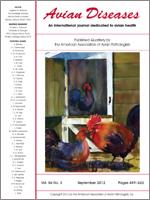CVI988 (Rispens) is currently the most effective vaccine used to protect against Marek's disease, a lymphoproliferative disease of chickens. A MEQ-deleted Marek's disease virus strain has shown promise as a vaccine candidate; however, unpublished results from vaccine safety trials suggest that this candidate vaccine induces unwanted lymphoid atrophy. The current study evaluated lymphoid atrophy at multiple time points between 2- and 8-wk postinoculation and attempted to correlate results with virus replication in the thymus. Results confirm reports that MEQ-deleted virus strains are able to cause thymus and bursa atrophy, which is most severe at 2-wk postinoculation. The MEQ-deleted virus strains induced lower body weights and relative thymus and bursa weights compared to uninoculated and Rispens-vaccinated chickens at multiple time points between 2- and 8-wk postinoculation. Both MEQ-deleted virus strains produced high levels of in vivo virus replication in the thymus at rates significantly greater than in Rispens-vaccinated chickens and were comparable to levels of RM1 virus, a MDV previously shown to induce severe thymus and bursa atrophy. Virus replication was highly correlated with relative thymus weights at each time point. Understanding this delicate balance between inducing maximum disease protection and preventing immunodepressive effects is critical for the development of future Marek's disease vaccines.
How to translate text using browser tools
1 September 2012
Ability of MEQ-Deleted MDV Vaccine Candidates to Adversely Affect Lymphoid Organs and Chicken Weight Gain
John R. Dunn,
Robert F. Silva
ACCESS THE FULL ARTICLE

Avian Diseases
Vol. 56 • No. 3
September 2012
Vol. 56 • No. 3
September 2012




